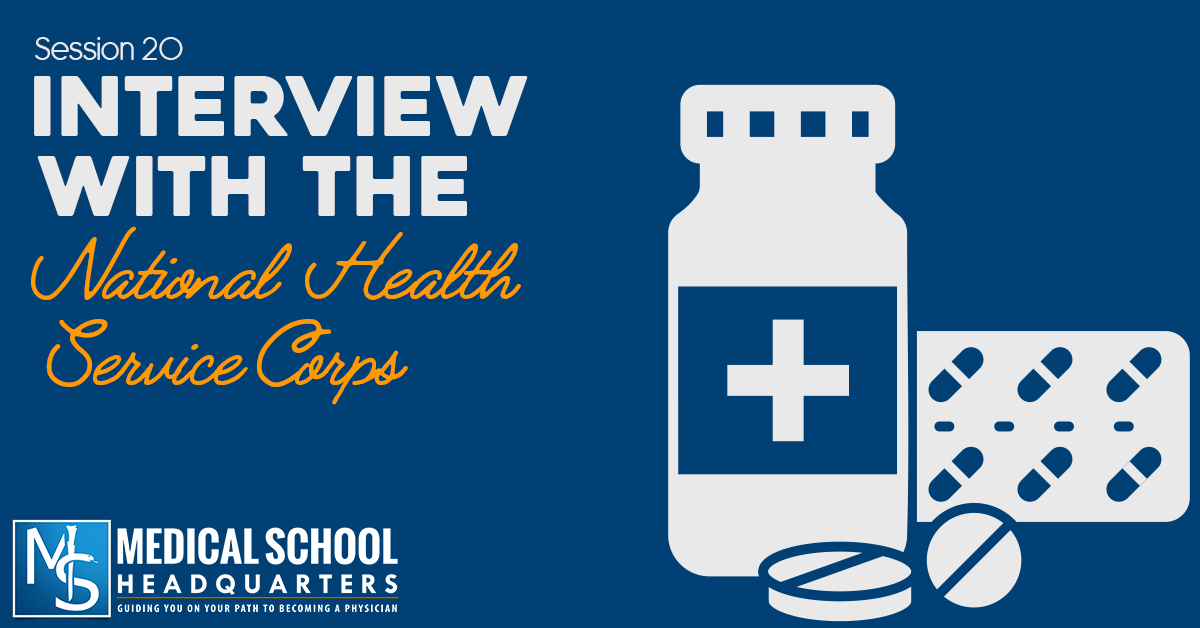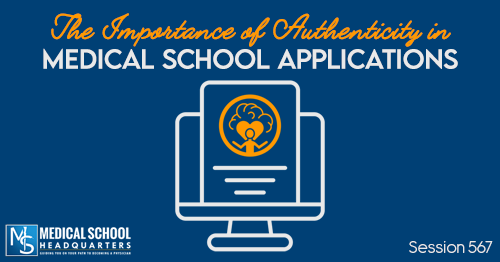Apple Podcasts | Google Podcasts
Session 20
 In today’s episode, I talk with the National Health Service Corps (NHSC) Scholarship Program.
In today’s episode, I talk with the National Health Service Corps (NHSC) Scholarship Program.
Back in session 18, we covered the Air Force HPSP Program. Both of these are scholarships that allow you to get medical school paid for and get a monthly stipend through medical school.
Listen to this podcast episode with the player above, or keep reading for the highlights and takeaway points.
About the NHSC Scholarship Program:
- The NHSC scholarship was authorized in 1974 to address the shortage of primary care physicians, especially in rural America.
- In the 1980s, NHSC added the loan repayment program.
- Accepting the scholarship doesn’t make you commit to living in a rural area; instead, NHSC sites are found throughout the country where there are underserved populations.
- The purpose of the NHSC scholarship is to increase access to care by supporting primary care providers as they practice in underserved areas.
- It provides for students pursuing a degree in the following health professions:
- internal medicine
- family medicine
- psychiatry
- pediatrics
- OB/GYN
- dentistry
- certified nurse midwives
- nurse practitioners
- physicians assistants
What the NHSC scholarship covers:
- Full tuition and fees (non-taxable)
- Other reasonable costs (books, microscope, instruments, etc.)
- Monthly stipend (taxable)
Years of scholarship available:
- 1-year minimum
- 4 years maximum
Required years of commitment:
- 2 years minimum to practice at an NHSC site located in a Health Professional Shortage Area (HPSA)
What happens if you break your commitment to primary care?
- If you’ve been supported by the NHSC scholarship and you switch from internal medicine to surgery, for example, you have to give back all the money given to you, plus penalties on top of that.
Health Professional Shortage Areas (HPSAs) defined:
- Using data sets for determining whether an area (typically a county) has a shortage of healthcare providers based on birth rate, morbidity, mortality, socioeconomics, how long it takes for an average person to drive to a healthcare facility, insurance, etc.
- Based on a scoring system of 0 to 26, with 26 indicating the highest needs
HPSA Scoring:
- HPSA re-scoring happens every 3 years.
- Scholars in their last year training enter into a placement cycle for one-on-one support.
- Some sites are not approved but are approvable.
- Rural areas are not the only settings. Many facilities are in urban areas, frontiers, reservations, etc.
Characteristics of HPSA populations:
- On Medicare and Medicaid
- No insurance
- Part of the workforce but without access to healthcare
How competitive is the National Health Service Corps scholarship program?
- They receive thousands of applications and have awarded over 200 awards in the past two years.
What makes you a good candidate for the NHSC scholarship?
- Being able to demonstrate that you can complete the program
- Demonstrated commitment to practicing in underserved areas
- Volunteering experiences and healthcare missions
- Priority is given to students with economically and socially disadvantaged backgrounds.
Which medical schools can you go to with the NHSC scholarship?
- The NHSC scholarship program allows you to attend any fully accredited medical school in the U.S.
Requirements for the NHSC application process:
- Completed online application
- Two letters of recommendation (academic and non-academic)
- Documentation (if you are from a disadvantaged background)
- Transcript
- CV
- 3 essays
- Current tuition and fees of the school you’re planning to attend
Robust initiative to help scholars prepare for practice:
- Webinars
- Podcasts
- Mentor program
Requirements for loan repayment option:
- Practicing at an NHSC-approved site
- Full-time or half-time
- Priority funding goes to providers practicing in higher-needs areas
Links and Other Resources:
- Check out the National Health Service Corps website.
- Check out my Premed Playbook series of books (available on Amazon), with installments on the personal statement, the medical school interview, and the MCAT.
- Related post: Medical School Scholarships: Get Paid to Study.
- Related episode: MSHQ Premed Scholarship.
- Need MCAT Prep? Save on tutoring, classes, and full-length practice tests by using promo code “MSHQ” for 10% off Next Step full-length practice tests or “MSHQTOC” for $50 off MCAT tutoring or the Next Step MCAT Course at Blueprint MCAT (formerly Next Step Test Prep)!











